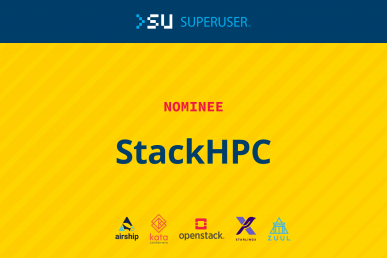Who do you think should win the 2022 Superuser Awards? The annual Superuser Awards is to recognize organizations that have used open infrastructure to improve their business while contributing back to the community.
This year, the Superuser Awards winner will be announced at the OpenInfra Summit Berlin, June 7-9! Join the global community for its first in-person Summit in over two years and collaborate directly with the people building and running open source infrastructure using OpenStack, Kubernetes and 30+ other technologies. Get your Summit tickets before the price increases on May 17!
Fairbanks is one of the 11 nominees for the Superuser Awards 2022. Check out why its team getting nominated:
Who is the nominee?
The Fairbanks International Group is nominated with the following teams: – The Cloud Ops team: Delivers cloud management, 24*7 monitoring and daily operations of customer open infrastructure private clouds, based on OpenStack, Ceph, openvswitch, Kubernetes, and others.
The OpenStack Expert team: Designs, builds, innovates, and troubleshoots OpenStack private clouds.
The Kubernetes Expert team: Designs, builds, innovates, and troubleshoots Kubernetes infrastructures.
The 42on Ceph Expert team: Designs, builds, innovates, and troubleshoots Ceph storage infrastructures.
How has open infrastructure transformed the organization’s business?
Fairbanks has supported OpenStack since 2012 and acquired 42on as a Ceph expert in 2019. As a global thought leader and Benelux Open Infrastructure ambassador, Fairbanks organized many events in the past and attended most Summits. We share with our customers the conviction that open infrastructures is a driving force for innovation. Besides fully managed services, we support clients with emergency assistance, expert consultancy on a change by change basis and applied operations training. Like our customers, we also value our independence and focus on the actual success they gain with OpenStack, Ceph and Kubernetes and like to operate as an extension of their own open infrastructure teams.
How has the organization participated in or contributed to an open source project?
Fairbanks has organized the OpenStack Benelux Days and 42on has always been one of the instigators of the Cephalocon Ceph days. Topics ranged from technical depth (with ‘technical deep dives’) to the use of OpenStack and Ceph in practice. We also organize one and two day Masterclasses to raise operational excellence for open infrastructures.
Being independent, we support almost any open infrastructure out there in some form. Whether is it software supported by subscriptions or community based. We join the vendor to resolve software issues, but the hardware vendor, networking team or application developers as well. We are fully open and transparent with all involved, assuring customer success above all.
What open source technologies does the organization use in its open infrastructure environment?
Fairbanks and 42on is an independent company supporting customers with operating a wide range of technologies from community distributions to Canonical, Red Hat and Mirantis OpenStack, Ceph and Kubernetes deployments. Apart from technologies like OpenStack, Kubernetes and Ceph, Fairbanks and 42on use and support open source supporting technologies like MAAS, JUJU, LXD, LXC, TripleO, OpenStack Ansible, OKD, et cetera.
Furthermore, additional open source tooling is used to provide the management of the infrastructures as well as monitoring and alerting; for example Grafana and Prometheus.
What is the scale of your open infrastructure environment?
Fairbanks has several open infrastructure deployments in support, ranging from small OpenStack environments with 15 hypervisors to large OpenStack deployments running 400+ hypervisors and even an OpenStack deployment with over 500,000 vCPUs. The Ceph infrastructure exists from TBs to more than 40 PB of Ceph storage.
Most of the Kubernetes clusters we support are running on top of OpenStack (LOKI). The Kubernetes infrastructure running at our clients also have a wide range of size, ranging from small software development infrastructures with 400 cores to Kubernetes clusters sizing over 50,000 cores in production.
What kind of operational challenges have you overcome during your experience with open infrastructure?
Managing multiple and varying customer platforms, we encounter all challenges imaginable. From hardware to deployment issues, from software bugs to unwanted application behavior. The teams we support often have been very successful in supporting their platforms but eventually meet the limits of their capabilities. For example, because their team loses a valued member, the platform grows due to its success beyond their control, workloads limit the options to perform patching and upgrading. Mostly practical challenges that require specialized one time expertise and experience. Our teams support the customer teams exactly for those moments: with a lot of patching and upgrading, dedicated troubleshooting expert and reusable solutions.
How is this team innovating with open infrastructure?
The teams innovate in the way they provide support to open infrastructure users. They don’t focus on distribution and software support, or limit customer flexibility by prescribing best practices. They just fully focus on the actual manifestation and behavior of the open infrastructure. They also stretch instead of limit the boundaries of the support, embracing full stack support in joint troubleshooting and design sessions with relevant teams such as networking teams, hardware management and application software developers. Although open infrastructure can provide generic cloud platforms, these teams have proven multiple times that the success of most platforms is not created in isolation, but by deeper understanding of the stack layers that run under and over the cloud platform.
The Superuser Editorial Advisory Board will review the nominees and determine the finalists and overall winner after the community has had a chance to review the nominees. Stay tuned!
- Demystifying Confidential Containers with a Live Kata Containers Demo - July 13, 2023
- OpenInfra Summit Vancouver Recap: 50 things You Need to Know - June 16, 2023
- Congratulations to the 2023 Superuser Awards Winner: Bloomberg - June 13, 2023

)










